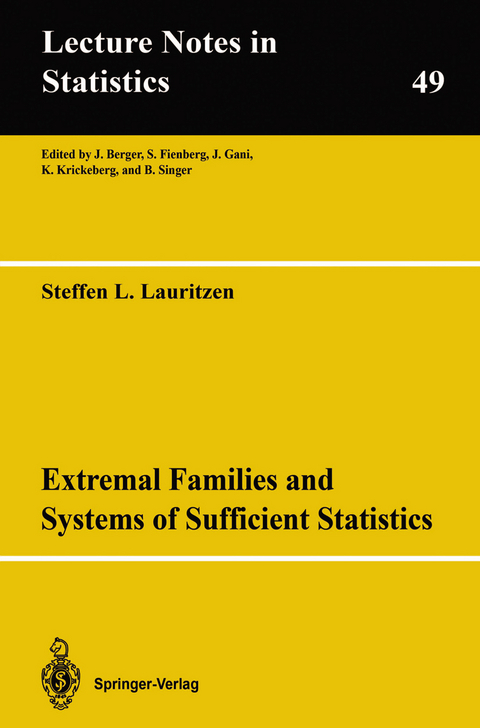
Extremal Families and Systems of Sufficient Statistics
Springer-Verlag New York Inc.
978-0-387-96872-8 (ISBN)
I The Case of a Single Experiment and Finite Sample Space.- 1. Basic facts. Maximal and extremal families.- 2. Induced maximal and extremal families.- 3. Convexity, maximal and extremal families.- 4. Some examples.- II Simple Repetitive Structures of Product Type. Discrete Sample Spaces.- 0. Conditional independence.- 1. Preliminaries. Notation.- 2. Notions of sufficiency.- 3. Maximal and extremal families.- 4. Limit theorems for maximal and extremal families.- 5. The topology of
$$/left( {/mathop{{/dot{U}}}/limits_{n} {{y}_{n}}} /right)UM.
$$
Boltzmann laws.- 6. Integral representation of M.- 7. Construction of maximal and extremal families.- 8. On the triviality of the tail ?-algebra of a Markov chain.- 9. Examples of extremal families.- 10. Bibliographical notes.- III Repetitive Structures of Power Type. Discrete Sample Spaces.- 0. Basic facts about Abelian semigroups.- 1. Extremal families for semigroup statistics.- 2. General exponential families.- 3. The classical case.zd-valuedstatistics.- 4. Maximum likelihood estimation in general exponential families.- 5. Examples of general exponential families.- 6. Bibliographical notes.- IV General Repetitive Structures of Polish Spaces. Projective Statistical Fields.- 0. Probability measures on Polish spaces.- 1. Projective systems of Polish spaces and Markov kernels.- 2. Projective statistical fields.- 3. Canonical projective statistical fields on repetitive structures.- 4. Limit theorems for maximal and extremal families on repetitive structures.- 5. Poisson Models.- 6. Exponential Families.- 7. Examples from continuous time stochastic processes.- 8. Linear normal models.- 9. The Rasch model for item analysis.- 10. Bibliographical notes.- Literature.
| Reihe/Serie | Lecture Notes in Statistics ; 49 |
|---|---|
| Zusatzinfo | XV, 268 p. |
| Verlagsort | New York, NY |
| Sprache | englisch |
| Maße | 155 x 235 mm |
| Themenwelt | Mathematik / Informatik ► Mathematik ► Angewandte Mathematik |
| Mathematik / Informatik ► Mathematik ► Statistik | |
| Mathematik / Informatik ► Mathematik ► Wahrscheinlichkeit / Kombinatorik | |
| ISBN-10 | 0-387-96872-5 / 0387968725 |
| ISBN-13 | 978-0-387-96872-8 / 9780387968728 |
| Zustand | Neuware |
| Haben Sie eine Frage zum Produkt? |
aus dem Bereich


